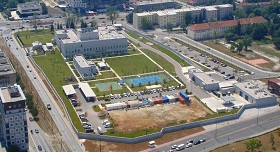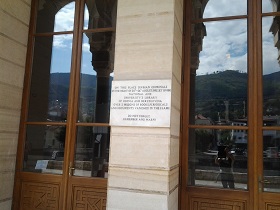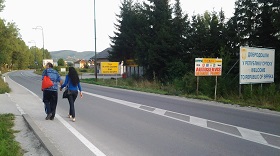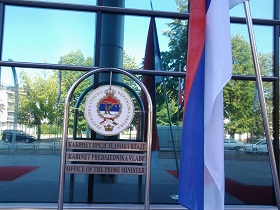On February 15, 2016, Bosnia and Herzegovina applied for EU membership. Statements made after the meeting between the Presidency of Bosnia and Herzegovina and leaders from the EU and other countries in Brussels suggest that the decision was roundly welcomed. There is a long road ahead, but those involved in the negotiations are not allowing any doubts to creep in. Which Bosnia intends to join the European Union? And what do the changes to this most difficult part of South-eastern Europe mean for the region as a whole?
Bosnia and Herzegovina is unique in that it is an international protectorate. Its integrity and resiliency is ensured by the Peace Implementation Council that oversees the implementation of the Dayton Peace Agreement, the Office of the High Representative in Bosnia and Herzegovina, which models political life in the republic, armed EU and NATO forces, and regular lines of credit. The High Representative’s mandate was supposed to finish its work in 2008, but its mandate was extended indefinitely. An important centre of influence is the U.S. Embassy in Sarajevo. It is deeply symbolic that it is located on the territory once occupied by the barracks of Josip Broz Tito’s Yugoslav People’s Army. Bosnia and Herzegovina does not have a constitution in the traditional sense of the word; the constitutional document that it does have is an appendix to the Dayton Peace Agreement.
For many years now, the High Representative for Bosnia and Herzegovina has been the Austrian diplomat of Slovene origin Valentin Inzko. He believes that the decision to apply for EU membership reflects the current reality and the interests of the people. “The states may have their own desires and goals, but the people decided long ago what they wanted. The majority of people who leave Bosnia, Serbia and Croatia usually go to Europe, so it is time that we took new steps in that direction.”
A Mini-Yugoslavia
The High Representative of the Union for Foreign Affairs and Security Policy Federica Mogherini says that she is “amazed” by the success of the Bosnian economy – an assessment that serves more as motivation than a statement of fact. The situation in Bosnia is no better than that in Bulgaria or Romania. Various sources indicate that the country’s economic problems – falling GDP, a negative trade balance, unemployment of 27–40 per cent – remain. It also has a significant amount of foreign debt, although it would seem that this is a non-factor, as EU members Croatia and Slovenia, as well as the candidate for membership Serbia, owe even more ($56 billion, $62 billion and $36 billion, respectively).
Article 2 of the Treaty of Lisbon says that applicant states must base their politics on the values of respect for human dignity, freedom, democracy, equality, the rule of law and respect for human rights, including the rights of persons belonging to minorities. The assumption is that in the 20 years since the signing of the Dayton Peace Agreement relations between the three peoples have been harmonized, forming a civil nation that has a feeling of togetherness, trust and equality. This is debatable.
Bosnia’s capital is hardly a symbol of multiculturalism. It is becoming more and more an Eastern city. Serbs (as well as Croats, incidentally) are extremely cautious when they are in downtown Sarajevo, talking in whispers and calling it a “foreign country”.
East Sarajevo – a Serbian micro-region on the outskirts of the city – can be seen as a zone of estrangement. Public transport does not serve this part of the city, the border of the enclave starts a few hundred metres from the last stop. Road signs point out that you are leaving one part of the federation and entering another. Segregation can also be felt in the Croat Muslim city of Mostar.
The selective and one-sided view of the Balkans’ recent history, which is great importance to the people of the region, does little to help get rid of the culture of distrust. For obvious regions, Sarajevo is full of memorials to those who dies (mostly Muslims) during the Serbian sieges of 1992–1995. But there is nothing that commemorates the shooting that took place during a Serbian wedding on March 1, 1992 – on the city’s main street (next to an Orthodox church) – which became one of the most important links in the escalation of the conflict.
Sarajevo City Hall (Vijećnica), which was destroyed during the siege, was reopened on May 9, 2014 after being reconstructed at the expense of the European Commission, Austria, Hungary and Spain. The sign on the entrance to the building explains that the building was burned down by “Serbian criminals”, with the words “Do not forget. Remember and Warn!” written below. Inside is a poignant exhibition dedicated to the events in Srebrenica. From this, it would be easy to assume that Bosnian Serbs are roundly hated, which, of course, is not true. The project’s international sponsors could have insisted on more tolerant words, at least in the interests of inter-ethnic dialogue.
While much has been done to overcome the uneasy legacy of the Bosnian War, these examples demonstrate that Serbs, who make up 33 per cent of the country’s population, are not seen as allies in the construction of the state, but rather as a defeated people – and displeasure with them is demonstrated accordingly. Can we really talk about equality, civic-mindedness and multiculturalism in such circumstances?
In actual fact, the state project of Bosnia and Herzegovina is a project of creating a Bosnian nation in name only. The country identifies itself as Muslim, even though Muslims still do not make up the majority of the population. The delicate balance is preserved by the international presence.
In a way, Bosnia today can be compared with the situation the country was in when it was under Austro-Hungarian rule from 1878 to 1908. Just as Vienna saw the annexation of Bosnia as a chance to strengthen the crown and weaken Serbia’s growing influence in the region, the application of Bosnia and Herzegovina today to become an EU member is confirmation of the country’s affluence for the European Union and the inevitability of taking the Euro-Atlantic path for its neighbours.
The main difference in the situation today is that the course being taken is officially supported by Belgrade and other republics. Bosnia today displays attributes of sovereignty. For example, NATO and a number of private companies have helped set up a border force and an army, which operate on a pro rata basis. An aggressive advertising campaign is being carried out to promote serving in the armed forces. And the lack of effectiveness of the country’s political institutions means that the army has become the main social institution and a symbol of unity in the republic.
Of course, this state of transition cannot last forever. As the integration process develops, we can expect more persistent attempts to revise the Dayton Peace Agreement. Some have complained that the country’s elites are not up to the task. For example, the much-discussed 2015 labour law caused controversy on new fewer than 26 points, with threats of mass protests similar to those that took place in February 2014 being bandied around (both links in Serbo-Croatian). There is also control over the media, which is being carried out on social and ideological, rather than national, grounds. Publications that propound internationalist, secular and anti-globalist positions, which are popular among the people, are viewed with suspicion and occasionally even suppressed.
The Position of the Autonomies
For two years now, a serious information and political campaign has been waged against the Republika Srpska. It is worth noting that a new twist in the campaign occurred around about the same time that relations between Russia and the West began to sour as a result of the Ukrainian crisis. The first publications, which in the Balkans were called “Russia’s Trojan Horse” in Europe, appeared in the summer and autumn of 2014.
In an article published by Foreign Policy magazine with the provocative title “Is War About to Break Out in the Balkans? (27.10.15), Vladimir Putin’s support for Milorad Dodik was seen as a source of problems for the West.
On February 3, 2016, Deutsche Welle published a one-sided piece calling the Republika Srpska an autonomous part of Bosnia and Herzegovina that “lives off EU funds without adopting EU values”.
The Republika Srpska is with increasing intensity being called the source of all Bosnia and Herzegovina’s misfortunes. This assertion is based on a substitution of ideas. The real problem lies in the existing ethnic and administrative management structure of Bosnia and Herzegovina. In a situation where three groups do not trust one another, the only instrument that can be used to prevent ethnic marginalization is national autonomy.
The struggle for the right to be an autonomous region rages. According to Republika Srpska calculations, 69 of its local powers have been transferred to Sarajevo. An end was put to this process by Milorad Dodik, and the fact that a representative of his Alliance of Independent Social Democrats party had a seat in the Presidency of Bosnia and Herzegovina. But the 2014 general election changed everything. The Alliance of Independent Social Democrats party received 20,000 fewer votes, saw its representation in parliament shrink from eight seats to six, and its position in the Presidency passed on to Dodik’s rival Mladen Ivanić.
Processes in Bosnia and Herzegovina take place at the regional level. Montenegro is expected to join NATO at the Warsaw Summit in July 2016. On February 12, 2016, Serbia signed an agreement with NATO, in accordance with which the latter would receive diplomatic immunity and freedom of movement in Serbia. Prime Minister of Serbia Aleksandar Vučić continues to change social consciousness, arguing that Serbia needs NATO as an ally in order to protect Serbs from Kosovo.
As we pointed out a year ago, Brussels is thus intensifying its presence in the Balkans, seeing it as an opportunity to put pressure on Russia. The results of the electoral processes provide additional possibilities. Certain things must be done to overcome the obstacles to integration processes that are inherent in the internal workings of the states. If this is done, a signal will be sent to the “Eastern Partnership” members that anything can be overcome, and even the most complex of states have a chance to be integrated further.
The Position of the Autonomies
Increased pressure and the weakening of its positions following the 2014 election has forced the Republika Srpska to make a number of moves.
2015 was marked by the possible referendum in the Republika Srpska on the court and the Presidency of Bosnia and Herzegovina (in essence, the issue of laws being imposed on the Republic from the centre, which goes against the constitution), the opponents of which quite deliberately treated as a separatist move. The referendum never took place. And on November 26, 2015, the Constitution Court of Bosnia and Herzegovina adopted a decision to outlaw the celebration of Republika Srpska Day on January.
As far as we know, the decision to apply for EU membership was taken without consulting the Republika Srpska. On January 26, 2016, the Council of Ministers of Bosnia and Herzegovina secretly decided to initiate a system of coordinated Euro-integration processes. The consultations with Banja Luka happened four days later. Under the circumstances, Milorad Dodik, who had made numerous anti-European Union speeches, had little choice on February 17 but to publicly declare his support for the course taken by Bosnia and Herzegovina.
***
It would therefore seem that the European Union has received an application for membership from a country whose internal problems can hardly be considered solved. However, recent events many lead to a significant change in the appearance of Bosnia and Herzegovina. The decision to grant the republic candidate status can only be motivated by political considerations. If Bosnia and Herzegovina is given candidate status, then it will be an invitation to carry out reforms in the country. And these reforms should be carried out under the slogan and improving governance and centralization. The next one to three years will be critical: the European Commission will need to make a decision; the issue of holding a referendum in the Republika Srpska will need to be addressed; and the next general election in Bosnia and Herzegovina is slated for 2018. EU candidate status opens the way for Bosnia to join NATO – the people have been prepared for this. The rigid position of Banja Luka with regard to the rights of the Republika Srpska risks another round of accusations of separatism and a new wave of attacks on the republic.









